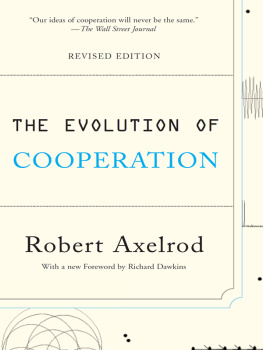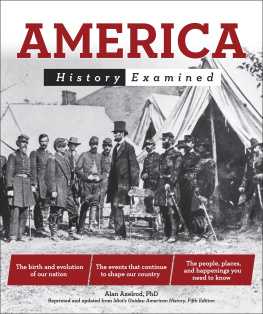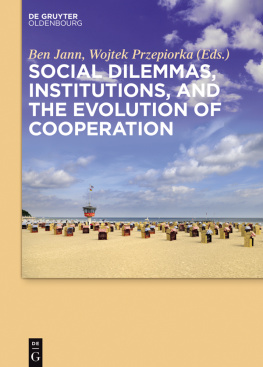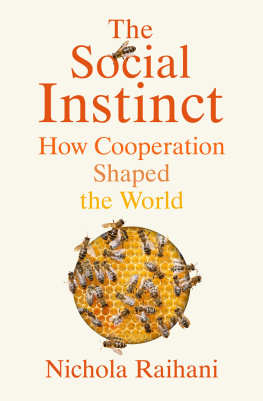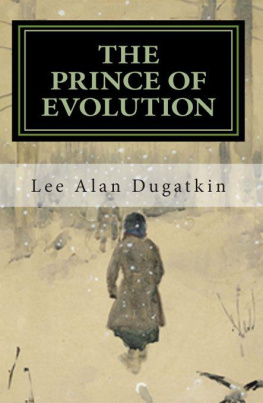Praise for The Evolution of Cooperation
I never expected to find wisdom or hope for the future of our species in a computer game, but here it is, in Axelrods book. Read it.
LEWIS THOMAS, State University of New York, Stony Brook
Our ideas of cooperation will never be the same again.... This book, if read, grasped and applied, could have a profound effect.
DANIEL KORNSTEIN, Wall Street Journal
A fascinating contribution to the theory of cooperation, and written in a clear, informal style that makes it a joy to read.
Times Literary Supplement
This is an exceptionally rich book and should be useful to anyone interested in promoting or inhibiting cooperative behavior.
Journal of Policy Analysis and Management
A remarkable mixture of theoretical analysis, anecdotal evidence, and a most unusual mode of empirical research.... In it he applies the prisoners dilemma to topics ranging from collusion among large corporations to US involvement in Vietnam
JAMES L. GOULD AND CAEOL GRANT GOULD, The Sciences
THE EVOLUTION
OF
COOPERATION
Robert Axelrod
An earlier version of appeared in The Journal of Conflict Resolution (1980).
An earlier version of appeared in the American Political Science Review (1981).
An earlier version of appears in Science 211 (27 March 1981):1390-96.
Copyright 1981 by the American Association for the Advancement of Science.
Copyright 1984 by Robert Axelrod
Originally published in 1984 by Basic Books,
A Member of the Perseus Books Group
Revised edition published in 2006 by Basic Books
All rights reserved. Printed in the United States of America. No part of this book may be reproduced in any manner whatsoever without written permission except in the case of brief quotations embodied in critical articles and reviews. For information, address Basic Books, 387 Park Avenue South, New York, NY 100168810.
Books published by Basic Books are available at special discounts for bulk purchases in the United States by corporations, institutions, and other organizations. For more information, please contact the Special Markets Department at the Perseus Books Group, 11 Cambridge Center, Cambridge MA 02142, or call (617) 252-5298 or (800) 255-1514, or e-mail .
A CIP catalog record for this book is available from the Library of Congress
Original publication: 0-465-02122-0 (cloth); 0-465-02121-2 (paper)
Revised edition:
ISBN-13:978-0-465-00564-2
ISBN-10:0-465-00564-0
eBook ISBN: 9780786734887
10 9 8 7
PREFACE
THIS PROJECT began with a simple question: When should a person cooperate, and when should a person be selfish, in an ongoing interaction with another person? Should a friend keep providing favors to another friend who never reciprocates? Should a business provide prompt service to another business that is about to be bankrupt? How intensely should the United States try to punish the Soviet Union for a particular hostile act, and what pattern of behavior can the United States use to best elicit cooperative behavior from the Soviet Union?
There is a simple way to represent the type of situation that gives rise to these problems. This is to use a particular kind of game called the iterated Prisoners Dilemma. The game allows the players to achieve mutual gains from cooperation, but it also allows for the possibility that one player will exploit the other, or the possibility that neither will cooperate. As in most realistic situations, the players do not have strictly opposing interests. To find a good strategy to use in such situations, I invited experts in game theory to submit programs for a Computer Prisoners Dilemma Tournamentmuch like a computer chess tournament. Each program would have available to it the history of the interaction so far and could use this history in making its choice of whether or not to cooperate on the current move. Entries came from game theorists in economics, psychology, sociology, political science, and mathematics, I ran the fourteen entries and a random rule against each other in a round robin tournament. To my considerable surprise, the winner was the simplest of all the programs submitted, TIT FOR TAT. TIT FOR TAT is merely the strategy of starting with cooperation, and thereafter doing what the other player did on the previous move.
I then circulated the results and solicited entries for a second round of the tournament. This time I received sixty-two entries from six countries. Most of the contestants were computer hobbyists, but there were also professors of evolutionary biology, physics, and computer science, as well as the five disciplines represented in the first round. As in the first round, some very elaborate programs were submitted. There were also a number of attempts to improve on TIT FOR TAT itself. TIT FOR TAT was again sent in by the winner of the first round, Anatol Rapo-port of the University of Toronto. Again it won.
Something very interesting was happening here. I suspected that the properties that made TIT FOR TAT so successful in the tournaments would work in a world where any strategy was possible. If so, then cooperation based solely on reciprocity seemed possible. But I wanted to know the exact conditions that would be needed to foster cooperation on these terms. This led me to an evolutionary perspective: a consideration of how cooperation can emerge among egoists without central authority. The evolutionary perspective suggested three distinct questions. First, how can a potentially cooperative strategy get an initial foothold in an environment which is predominantly noncooperative? Second, what type of strategy can thrive in a variegated environment composed of other individuals using a wide diversity of more or less sophisticated strategies? Third, under what conditions can such a strategy, once fully established among a group of people, resist invasion by a less cooperative strategy?
The tournament results were published in the Journal of Conflict Resolution (Axelrod 1980a and 1980i), and are presented here in revised form in .
After thinking about the evolution of cooperation in a social context, I realized that the findings also had implications for biological evolution. So I collaborated with a biologistWilliam Hamiltonto develop the biological implications of these strategic ideas. This resulted in a paper published in Science (Axelrod and Hamilton 1981) which appears here in revised form as . The paper has been awarded the Newcomb Cleveland Prize of the American Association for the Advancement of Science.
This gratifying response encouraged me to present these ideas in a form that would make them accessible not only to biologists and mathematically oriented social scientists but also to a broader audience interested in understanding the conditions that can foster cooperation among individuals, organizations, and nations. This in turn led me to see applications of the ideas in a great variety of concrete situations, and to appreciate how readily the results could be used to generate implications for private behavior and for public policy.
One point worth stressing at the outset is that this approach differs from that of sociobiology. Sociobiology is based on the assumption that important aspects of human behavior are guided by our genetic inheritance (e.g., E. O. Wilson 1975). Perhaps so. But the present approach is strategic rather than genetic. It uses an evolutionary perspective because people are often in situations where effective strategies continue to be used and ineffective strategies are dropped. Sometimes the selection process is direct: a member of Congress who does not accomplish anything in interactions with colleagues will not long remain a member of Congress.

